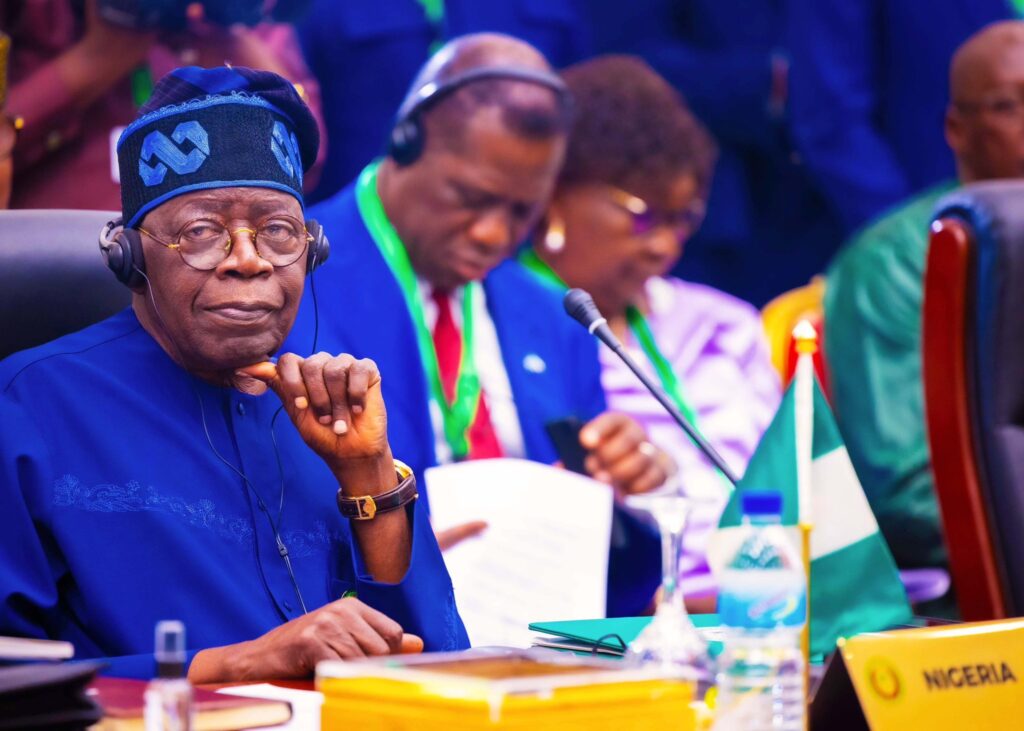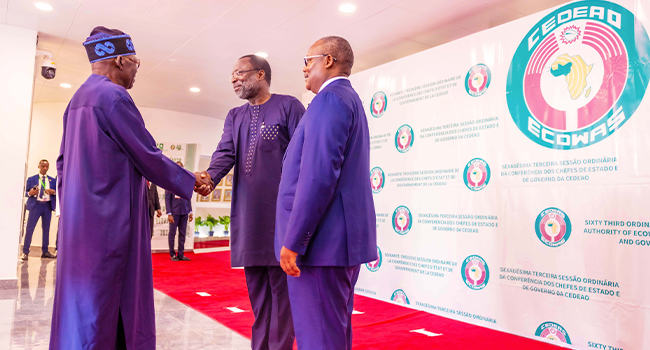In the heart of West Africa, a region grappling with a myriad of challenges ranging from insecurity to economic instability and political unrest, a seasoned Nigerian politician has assumed a pivotal role. Bola Ahmed Adekunle Tinubu, the national leader of the All Progressives Congress (APC) and former Governor of Lagos State, has been appointed as the new Chairman of the Economic Community of West African States (ECOWAS). This appointment holds immense significance for not just Nigeria but the entire West African region. As ECOWAS seeks to promote economic integration, political cooperation, and social development among its fifteen member states, Tinubu’s leadership comes at a crucial juncture.
Bola Tinubu’s political career, marked by astute leadership and governance, provides a strong foundation for his role as ECOWAS Chairman. Having served as the Governor of Lagos State, one of Nigeria’s economic powerhouses, he possesses invaluable experience in the intricacies of governance. This background equips him with the insight needed to navigate the complex challenges facing the region.
ECOWAS, the Economic Community of West African States, is a regional economic union established to foster economic integration and cooperation among its member states. Its objectives encompass economic development, political stability, and social progress. As the Chairman of ECOWAS, Tinubu is set to play a pivotal role in advancing these objectives.
The West African region grapples with a plethora of challenges and tinubu’s leadership is poised to address them head-on:
Insecurity: A Multifaceted Challenge
One of the foremost challenges confronting West Africa is the alarming rise in insecurity. This multifaceted problem is characterized by various forms of threats, including terrorism, insurgency, and transnational crime. These security issues not only jeopardise the safety and well-being of citizens but also impede the region’s progress and stability. Bola Tinubu’s tenure as ECOWAS Chairman is expected to place a strong emphasis on addressing these security concerns through collaborative strategies.
- Terrorism and Insurgency: West Africa has been grappling with the scourge of terrorism and insurgency for several years. Groups like Boko Haram in Nigeria, jihadist organisations in Mali, and extremist elements in Burkina Faso have unleashed violence, leading to loss of lives, displacement of communities, and disruption of economic activities. Tinubu’s leadership will likely prioritise a coordinated regional response to counter these extremist groups, emphasising intelligence sharing, joint military operations, and strategies to address the root causes of extremism.
- Transnational Crime: The region is also plagued by transnational crime, including drug trafficking, human trafficking, and arms smuggling. These criminal activities thrive in the absence of robust cross-border cooperation. Tinubu’s chairmanship presents an opportunity to bolster regional law enforcement mechanisms, enhance border security, and disrupt criminal networks that operate across national boundaries.
Economic Instability: Navigating Choppy Waters
Economic instability is another formidable challenge that West Africa must confront. The region’s economies are often characterised by volatility, driven by factors such as fluctuating commodity prices, trade imbalances, and the far-reaching impact of the COVID-19 pandemic. This instability poses a significant hurdle to the development and prosperity of ECOWAS member states. Bola Tinubu’s background in economic management positions him well to drive regional efforts to achieve economic stability and sustainable growth.
- Fluctuating Commodity Prices: Many West African countries heavily rely on the export of commodities like oil, minerals, and agricultural products. These economies are vulnerable to the unpredictable swings in global commodity prices. Tinubu’s leadership may involve advocating for economic diversification, encouraging value addition to commodities, and exploring ways to buffer member states from the adverse effects of price fluctuations.
- Trade Imbalances: The region often faces trade imbalances, with some countries being net importers and others net exporters. Tinubu could champion initiatives to promote intra-regional trade, reduce trade barriers, and harmonise economic policies to foster a more balanced and equitable trade environment.
- COVID-19 Impact: The COVID-19 pandemic has exposed vulnerabilities in healthcare systems and disrupted economic activities across West Africa. Tinubu’s tenure may see efforts to strengthen healthcare infrastructure, enhance pandemic preparedness, and explore avenues for post-pandemic economic recovery and resilience.
Political Unrest: Navigating the Path to Stability
In addition to insecurity and economic challenges, several West African nations have experienced political unrest and transitions in recent years. These developments have often raised concerns about democratic governance and political stability. Bola Tinubu’s leadership could play a pivotal role in providing support for democratic processes and promoting stability in the region.
- Democratic Governance: West Africa has made strides in embracing democratic governance, but challenges persist, including issues related to electoral integrity, political transitions, and the consolidation of democratic institutions. Tinubu’s tenure may involve advocating for free and fair elections, supporting electoral commissions, and fostering a culture of democratic accountability.
- Conflict Resolution: Some West African countries have experienced political conflicts and crises. Tinubu’s leadership could prioritise conflict resolution mechanisms, diplomatic interventions, and mediation efforts to prevent and address political disputes and violence.
- Transitions of Power: Peaceful transitions of power are essential for political stability. Tinubu may emphasise the importance of adherence to constitutional processes and the rule of law during political transitions, discouraging coups and extra-constitutional changes of government.

Bola Tinubu has long been a proponent of regional integration and cooperation. His appointment as ECOWAS Chairman is a testament to his unwavering commitment to these ideals. Key areas of focus under his leadership may include:
- Security: Bolstering regional security mechanisms to combat terrorism, insurgency, and organised crime. The region has experienced a surge in insecurity, exemplified by the activities of Boko Haram in Nigeria, jihadist groups in Mali, and piracy in the Gulf of Guinea. Tinubu’s leadership will likely prioritise coordinated efforts among member states to address these security challenges.
- Economic Development: Promoting regional trade, investment, and economic growth for the benefit of member states. West Africa is rich in natural resources, yet economic disparities persist. Tinubu’s experience in economic management, gained during his tenure as Lagos State Governor, positions him well to drive initiatives aimed at reducing these disparities and fostering economic integration.
- Political Stability: Supporting democratic governance and conflict resolution to ensure political stability. Tinubu’s commitment to democratic principles aligns with ECOWAS’ mission to promote good governance and uphold democratic values in the region. His leadership can be expected to emphasise the importance of free and fair elections and peaceful transitions of power.
- Collaboration: Fostering greater collaboration among member states, regional organisations, and international partners to address shared challenges. ECOWAS often collaborates with other regional bodies and international organisations. Tinubu’s diplomatic skills and political network will likely play a crucial role in strengthening these partnerships to tackle complex regional issues.
While Bola Tinubu’s appointment as ECOWAS Chairman presents promising opportunities, it also comes with its fair share of challenges:
- Institutional Limitations: ECOWAS, like many regional organisations, faces challenges related to its institutional effectiveness. Tinubu will need to navigate these constraints to ensure that ECOWAS can effectively address regional issues.
- Resource Allocation: The allocation of resources for regional initiatives and projects can be a contentious issue among member states. Tinubu’s leadership will require diplomatic finesse to ensure equitable distribution and buy-in from all member states.
- Regional Security Threats: West Africa’s security landscape is complex, with a range of threats from terrorism to maritime piracy. Tinubu will need to coordinate security efforts, which may include intelligence sharing, joint military operations, and conflict resolution mechanisms.
- Economic Integration: Promoting economic integration is a long-term goal that requires addressing trade barriers, harmonising economic policies, and fostering a conducive business environment. Tinubu’s experience in economic management will be vital in advancing this agenda.

Bola Tinubu’s appointment as Chairman of ECOWAS marks a significant development for Nigeria and the broader West African region. His extensive experience in governance and leadership positions him favourably to tackle the pressing challenges confronting ECOWAS member states. With a strategic focus on security, economic development, and political stability, Tinubu’s leadership promises to usher in an era of increased prosperity and peace for West Africa. As the region looks to the future, it does so with cautious optimism, hopeful that under Tinubu’s guidance, ECOWAS will continue to evolve as a beacon of regional integration and cooperation, working tirelessly to address the multifaceted challenges and opportunities that define this vibrant part of the African continent.
Source
- https://punchng.com/just-in-tinubu-emerges-ecowas-chairman/#:~:text=President%20Bola%20Tinubu%20emerged%20as,%2C%20capital%20of%20Guinea%2DBissau
- https://theconversation.com/bola-tinubu-is-the-new-chair-of-ecowas-the-burning-issues-that-face-the-nigerian-president-20965
- https://www.channelstv.com/2023/07/09/president-tinubu-emerges-ecowas-chairman/
- https://www.arise.tv/tinubu-named-chairman-of-ecowas/




